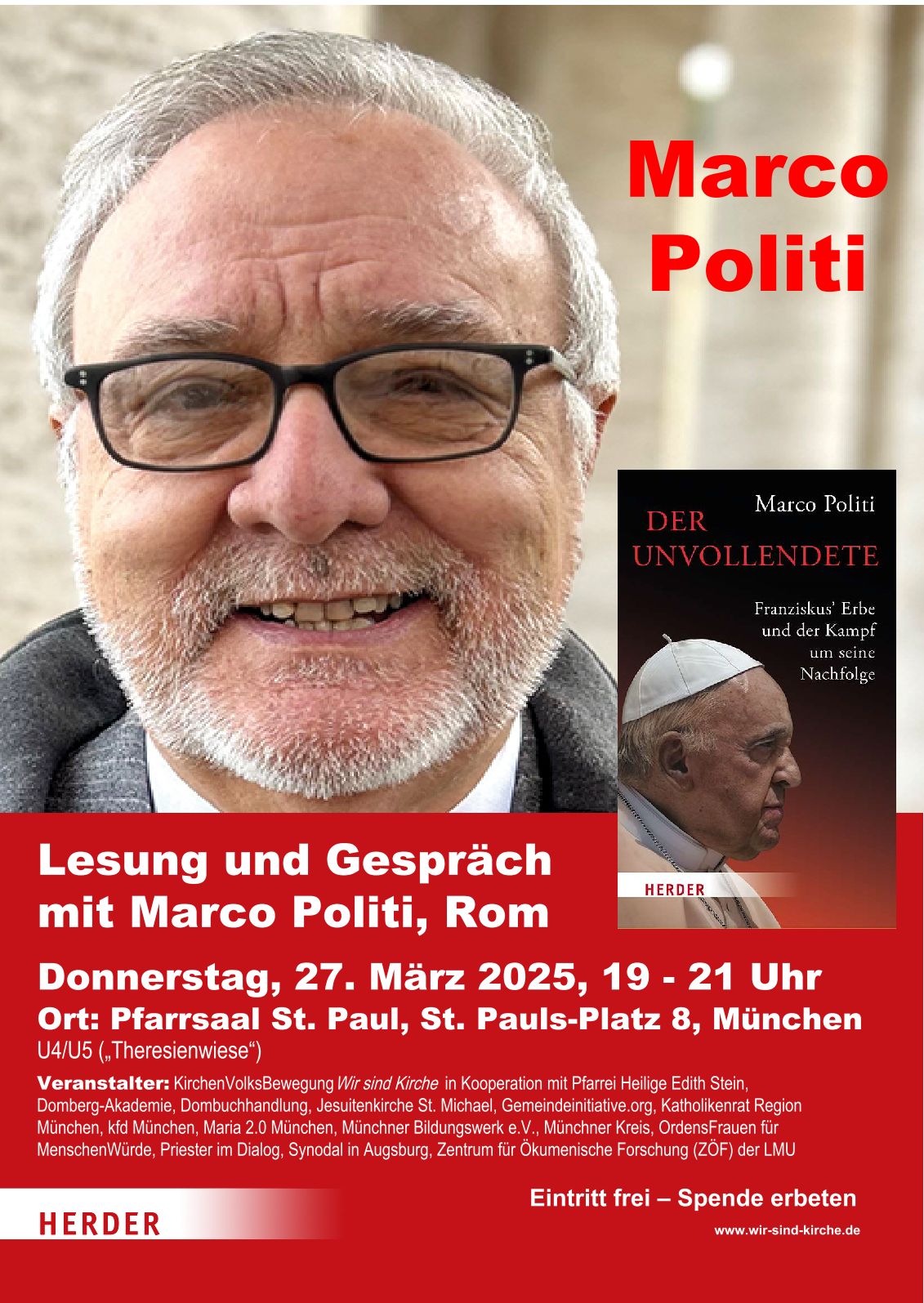- Details
Reformgruppen zur DBK-Vorsitz-Wahl
„Diese Wahl ist keine Routineentscheidung“
Gemeinsame Pressemitteilung katholischer Reformgruppen zur Wahl des neuen Vorsitzenden der Deutschen Bischofskonferenz (DBK)
Würzburg, 23. Februar 2026
Die Neuwahl des Vorsitzenden der DBK ist keine „0815-Wahl“, sondern findet inmitten einer tiefen Kirchenkrise statt – geprägt von Vertrauensverlust nach der Missbrauchskatastrophe, schleppender Reformumsetzung, massiven Kirchenaustritten und wachsender innerer wie äußerer Polarisierung. Wer diese Wahl auf eine Personalfrage reduziert, verkennt ihre kirchenpolitische Tragweite.
Der Verzicht von Bischof Dr. Georg Bätzing auf eine zweite Kandidatur ist deshalb sehr bedauerlich und stellt ein großes Risiko für künftige Reformen dar. Er zeigt zugleich die strukturellen Grenzen dieses Amtes auf, denn das Amt des Vorsitzenden ist kein Leitungsamt mit Durchgriffsrechten, sondern wesentlich auf Moderation angewiesen. Genau darin liegt das Dilemma: Verantwortung wird personalisiert, Macht bleibt kollektiv gebunden – und Blockade ist jederzeit möglich. Bischof Bätzing fand seine Grenzen nicht zuletzt am Widerstand aus Rom, am demonstrativen Ausstieg einzelner Bischöfe aus gemeinsamen Reformprozessen, an der trägen Zurückhaltung zahlreicher Amtsbrüder, an unzureichender Umsetzung synodaler Beschlüsse sowie am beredten Schweigen vieler Weihbischöfe. Die kirchenrechtlich bewusst eng gesetzten Kompetenzen des Vorsitzenden sind Teil dieses Problems.
Gegen Wende rückwärts Kirche und Gesellschaft
Innerkirchlich gewinnen Kräfte an Einfluss, die unter dem Schlagwort „Lehrtreue“ autoritäre Leitungsmodelle, klerikale Machtkonzentration und eine Rückabwicklung synodaler Prozesse propagieren. Reformbeschlüsse werden relativiert, verzögert oder faktisch ausgebremst. Gleichzeitig erstarken gesellschaftlich nationalistische und demokratiefeindliche Strömungen, die religiöse Sprache instrumentalisieren, um Ausgrenzung zu legitimieren. Ein Schulterschluss von religiösem Fundamentalismus und politischem Autoritarismus widerspricht dem Evangelium ebenso wie der katholischen Soziallehre. Wie Bischof Bätzing muss auch der neue Vorsitzende diesem Rechtsruck entschieden widerstehen – innerkirchlich wie gesellschaftlich. Doch er kann das nur, wenn ihn die Mehrheit der Bischöfe mitträgt.
Reform ist keine Option, sondern Verpflichtung.
Der Synodale Weg hat grundlegende Texte verabschiedet: zur Stärkung von Teilhabe und Transparenz, zum Abbau klerikaler Machtstrukturen, zur Beteiligung von Laien, zur Öffnung kirchlicher Dienste und Ämter, zur Weiterentwicklung der Sexualmoral sowie zu neuen Perspektiven auf Zölibat und priesterliche Lebensform. Diese Beschlüsse sind keine unverbindliches Diskussionspapiere, sondern Ausdruck eines verbindlichen Reformwillens. Ihre bislang zögerliche oder uneinheitliche Umsetzung seitens der Bischöfe beschädigt Glaubwürdigkeit und Vertrauen der gesamten Kirche weiter.
Forderung an die Gesamtheit der Bischöfe.
Die Bischöfe müssen einen Nachfolger wählen, der Missbrauchsaufarbeitung und Reformprozesse mindestens ebenso entschieden – wenn nicht sogar noch entschiedener – vorantreibt wie sein Vorgänger. Und sie müssen den neuen Vorsitzenden deutlich stärker unterstützen, als sie es bislang getan haben. Wenn interne Machtspiele, taktisches Abwarten oder römische Rücksichtnahmen erneut dazu führen, dass Beschlüsse versanden, wären die Anstrengungen des Synodalen Weges weitgehend entwertet und die Austrittszahlen werden weiter steigen.
Ein neuer Vorsitzender muss darüber hinaus ausdrücklich bereit sein, sich an gemeinsam mit Laien getroffene Entscheidungen zu halten. Synodalität darf kein konsultatives Feigenblatt bleiben, sondern muss reale Mitverantwortung und geteilte Entscheidungsgewalt bedeuten. Wer Beteiligung verspricht, sich im Ernstfall aber auf hierarchische Letztentscheidungsrechte zurückzieht, untergräbt Glaubwürdigkeit und Vertrauen erneut.
Die katholische Kirche in Deutschland braucht daher nicht nur einen mutigen Vorsitzenden, sondern ein mutiges Episkopat mit einer Leitung, die Synodalität nicht nur moderiert, sondern vorantreibt und lebt. Die anstehende Wahl entscheidet nicht allein über eine Personalie, sondern darüber, ob die römisch-katholische Kirche in Deutschland den Weg glaubwürdiger Erneuerung weitergeht – oder in innerer Lähmung und kulturkämpferischer Selbstverengung verharrt.
Deshalb fordern wir die Deutsche Bischofskonferenz auf, sich diese Verantwortung bewusst zu machen und zukunftsorientiert zu wählen.
Unterzeichnende Reformgruppen und Kontakte
Freckenhorster Kreis
Ludger Ernsting,
Gemeindeinitiative.org
Willi Genal, Elisabeth Stanggassinger, Paul-G. Ulbrich
Initiative Münchner Kreis, eine Intiative von den in der Pastoral Tätigen der Erzdiözese München-Freising
Ulrike Leininger, Sprecherteam:
Initiative Sauerteig
Rosi Mittermeier,
Initiativgruppe vom Zölibat betroffener Frauen
Katholisches LSBT+ Komitee
Renée Zentiks, Markus Gutfleisch, Hendrik Johannemann
Maria 2.0
Altfrid Norpoth,
Maria 2.0 Augsburg
Maria2.0 Rheinland
Dorothee Arbogast-Bücken, Maria Mesrian.
meinGottdiskriminiertnicht
Lisa Baumeister,
Ökumenische Arbeitsgruppe Homosexuelle und Kirche (HuK) e.V.
Thomas Pöschl,
OutInChurch e.V.
Rainer Teuber,
Pfarrer-Initiative Deutschland: Max Stetter
E-Mail:
Priester im Dialog
Dr Edgar Büttner,
pro concilio
Dr. Martin Schockenhoff,
Regenbogenforum e.V. – Christliche LSBTIQ*-Gruppen in Deutschland
Wolfgang Perlák (er/ihn)
Synodal-in-Augsburg
Uli Spindler,
Wir sind Kirche Bundesteam
Sigrid Grabmeier,
Christoph Schomer,
Christian Weisner (vom 23. bis 25. Februar in Würzburg vor Ort)
Druckversion der Pressemeldung
- Details

Nichts mehr auf die lange Bank schieben
Zusammenschluss der Reformkräfte zur 6. Synodalversammlung
München/Stuttgart, 27. Januar 2026. Gemeinsam die Synodalen an die nötigen konkreten Umsetzungen von Beschlüssen erinnern und diese einfordern – das möchten die katholischen Reformkräfte zur 6. und letzten Synodalversammlung vom 29. bis 31. Januar 2026 in Stuttgart.
Acht Reformgruppen haben sich heute, am 27. Januar, im Rahmen eines Pressegesprächs den Fragen der Journalist*innen und Medienschaffenden gestellt. Ihnen allen ist wichtig: Der synodale Prozess in Deutschland muss weitergehen, ein Stillstand ist nicht hinnehmbar. Reformen dürfen nicht mehr auf die lange Bank geschoben werden.
Das gemeinsame Auftreten von verschiedenen katholischen Verbänden und Organisationen zeigt einmal mehr, welch hoher Bedeutung der Synodalversammlung beigemessen wird. Alle Reformgruppen werden am Donnerstag, 29. Januar, ab 11:30 Uhr am Maritim-Hotel in Stuttgart sein und eine gemeinsame Aktion durchführen. Sie möchten mit den Synodalen ins Gespräch kommen und sie ermutigen, für eine konkrete Umsetzung der Ergebnisse des Synodalen Wegs und für eine synodale Kirche einzutreten. Die acht Reformgruppen stehen auch vor Ort für Interviews zur Verfügung.
Zitate aus dem Pressegespräch
- Christian Weisner, Dachau, Bundesteam KirchenVolksBewegung Wir sind Kirche
„Wir Reformkräfte sprechen für die große Mehrheit der Katholikinnen und Katholiken in Deutschland. Der deutsche Synodale Weg ist kein Sonderweg. Allerdings hat der vatikanische Eingriff in die Satzung der künftigen Synodalkonferenz deutlich gemacht, dass verbindliche Synodalität innerhalb des bestehenden hierarchischen Kirchenrechts kaum möglich ist.“ - Ulrike Göken-Huismann, Düsseldorf, stv. Bundesvorsitzende der Katholischen Frauengemeinschaft Deutschlands (kfd) – Bundesverband e. V. und Mitglied des Synodalen Weges
„Die kfd appelliert an die Verantwortlichen in der katholischen Kirche in Deutschland, die Umsetzung der Grund- und Handlungstexte nicht auf die lange Bank zu schieben. Klare konkrete Schritte sind dringend nötig. Wir erwarten den Einsatz der 6. Synodalversammlung für die Zulassung zu allen Diensten und Ämtern für Frauen.“
- Dorothee Sandherr-Klemp, Köln, Geistliche Beirätin des Katholischen Deutschen Frauenbundes e.V. (KDFB)
„Gerade in einer Zeit der entfesselten politischen Machtspiele und des Machtmissbrauchs, in einer Hoch-Zeit der vermeintlich starken Männer und selbsternannten Führer, die das Recht des Stärkeren einfordern, brauchen wir dringend das jesuanische ‚Bei euch aber soll es nicht so sein‘: Genau dafür steht der Synodale Weg!“ - Katharina Hubrich, Osnabrück, seit Beginn engagiert bei Maria 2.0
„Besonders zwei Punkte liegen uns am Herzen: - Der Umgang mit Überlebenden sexualisierter Gewalt muss entbürokratisiert und von großzügigen Entschädigungen geprägt sein.
- Was wäre es für ein Zeichen für die Situation von Frauen weltweit, wenn die katholische Kirche die Rechte von Frauen denen der Männer gleichstellen würde!“
- Rainer Teuber, Essen, Mitorganisator und Sprecher, #OutInChurch e.V.
„Es kommt also nun einerseits auf die Verantwortlichen in den Bistümern an. Andererseits sind alle gefordert, denen an einer diskriminierungsfreien Kirche gelegen ist, denn Kulturwandel erfordert ein zusammenwirken von vielen Menschen auf verschiedenen Ebenen und in unterschiedlichen Wirkungskreisen.“
- Volker Andres, Düsseldorf, Bundesvorsitzender des Bundes der Deutschen Katholischen Jugend (BDKJ)
„Wir möchten die großartige Arbeit der jungen Synodalen, der ‚15 unter 30‘ und vielen damit solidarisierten Synodalen loben und uns bei diesen Menschen bedanken. Sie bereicherten die Arbeit des Synodalen Weges immens, und spendeten damit gleichzeitig vielen Menschen Hoffnung und Mut, dass diese Kirche auch ein Ort für sie sein möchte und eine gute Zukunft hat. Sie haben gezeigt, wie wertvoll junge Stimmen für die Prozesse der Kirche sind.“ - Paul-G. Ulbrich, München, Sprechendenteam Gemeindeinitiative.org
„Kirche muss zukünftig in enger Orientierung an Jesu Handeln wieder von den Menschen und ihren Bedürfnissen her gestaltet werden. Das Kleben an einem männerbündisch-hierarchisch-absolutistischen Klerikalsystem, das eine Zweiklassenkirche schuf, ist geschichtlich gewachsen und somit veränderbar.“ - Martin Schockenhoff, Stuttgart, Leitungsteam pro concilio
„Reformen müssen in den Kirchengemeinden ankommen und sich dort auswirken. Ohne Reformen können örtliche Kirchengemeinden als Glaubensgemeinschaften nicht überleben. In Anlehnung an Karl Rahner: Sie werden reformiert sein, oder sie werden nicht mehr sein.“
Die Pressemappe mit den Statements der Reformkräfte finden Sie auf der Website
'Gemeinsame Aktion von Reformgruppen zum Beginn der 6. Synodalversammlung am Donnerstag, 29. Januar 2026 in Stuttgart'
Pressekontakt:
Katholische Frauengemeinschaft Deutschland (kfd) – Bundesverband e.V.
Barbara Stöckmann (Pressereferentin der kfd)
Tel.: 0211 44992-25, E-Mail:
(am 29. Januar 2026 in Stuttgart vor Ort)
Katholischer Deutscher Frauenbund e.V. (KDFB)
Hannah Ratermann (Pressereferentin des KDFB)
Tel: 0221 86092-24, E-Mail:
KirchenVolksBewegung Wir sind Kirche
Christian Weisner (Wir sind Kirche Bundesteam)
Tel: 0172 5184082, E-Mail:
(vom 29. bis 31. Januar 2026 in Stuttgart vor Ort)
- Details
Reformkräfte zur Synodalversammlung in Stuttgart

Am letzten Januar-Wochenende (29.–31. Januar 2026) findet die entscheidende sechste Synodalversammlung in Stuttgart statt. Am Donnerstag, den 29. Januar 2026, werden BDKJ, Gemeindeinitiative.org, KDFB, kfd, Maria 2.0, #outinchurch, pro concilio und Wir sind Kirche ab 11:30 Uhr die Mitglieder der Synodalversammlung in Stuttgart vor dem Hotel Maritim freundlich begrüßen.
Wenn Sie in der Nähe wohnen, kommen Sie am 29. Januar 2026 nach Stuttgart und laden auch andere dazu ein. Helfen Sie mit, dass die Mühen des Synodalen Weges der letzten sechs Jahre nicht vergebens sind!
> Gesamtprogramm der Reformkräfte für Stuttgart
- Details
10.12.2025
„Gefangen im Schweigen – Vom Trauma zur Sucht“ ein Film über die Langzeitfolgen von sexualisierter Gewalt im Kontext der katholischen Kirche
Im Rahmen eines Unterstützungsprojekts für einen Betroffenen von sexualisierter Gewalt entstand der 30-minütige Film "Gefangen im Schweigen - Vom Trauma zur Sucht" über die Langzeitfolgen sexualisierter Gewalt in der Kindheit und Jugend im Kontext der katholischen Kirche. Die Betroffeneninitiative Eckiger Tisch e.V. hat diesen Film mit berührenden Zeugnissen von Betroffenen herstellen lassen, um aufzuzeigen, wie vielfältig und weitgehend die Folgen von sexualisierter Gewalt in der Kindheit und Jugend für Betroffene sind.
Link zum Film: https://youtu.be/e3mA9aJTRdE
TW: Dieser Film thematisiert Inhalte zu sexualisierter Gewalt, Esstörungen
und Suchterkrankungen, die belastend sein können.
In dem Unterstützungsprojekt ist die Gemeindeinitiative mit engagiert. Eine detaillierte Pressemeldung zu Projekt und Film finden Sie unter: https://www.eckiger-tisch.de/wp-content/uploads/2025/12/20251216_Begnadigung-fuer-Missbrauchsbetroffenen-Andreas-Perr.pdf
- Details

- Details
„Den Rückenwind aus Rom nutzen!“
Reformkräfte zum 5. Synodalen Ausschuss am 21./22. November 2025 in Fulda
Pressemeldung, 20. November 2025 > als PDF 2 Seiten
Vor der letzten Sitzung des Synodalen Ausschusses am 21./22. November 2025 in Fulda appellieren 18 katholische Verbände, Gruppen und Initiativen erneut in aller Dringlichkeit vor allem an die Bischöfe, den Rückenwind von der Weltsynode und dem jüngsten Synodentreffen zum Heiligen Jahr in Rom zu nutzen, um die katholische Kirche in Deutschland zu einer synodalen Kirche zu machen. Nur so kann es gelingen, dem massiven Glaubwürdigkeitsverlust zu begegnen, den Missbrauch, Vertuschung und Reformstau verursacht haben. Dazu braucht es aber „konkrete kurzfristige Veränderungen“, ohne die „die Vision einer synodalen Kirche nicht glaubwürdig sein“ wird, wie es im Abschlussdokument der Weltsynode (Nr. 94) heißt, das von Papst Franziskus ausdrücklich lehramtlich bestätigt wurde.
Beschlossene Reformen jetzt schnell umsetzen
Deshalb appellieren wir Reformkräfte jetzt noch einmal ausdrücklich, zu den in den vergangenen fünf Jahren im deutschen Synodalen Weg erarbeiteten Positionen (z.B. „Frauenfrage“, LGBTIQ+, Dienste und Leitungsformen, Pflichtzölibat) zu stehen, diese pastoral weiterzuentwickeln und kirchenrechtlich umzusetzen. Regelungen, die nicht die Zustimmung Roms brauchen, können und sind von den Bischöfen sofort in ihren Diözesen einzuführen.
Die erarbeiteten Papiere und Beschlüsse haben auch weltkirchlich große Beachtung gefunden. Die gemeinsam erstellte Handreichung „Segnungsfeiern für Paare, die sich lieben“, deren zugrundeliegender Handlungstext bei der fünften Synodalversammlung im März 2023 von über 92 Prozent der Delegierten verabschiedet wurde, sollte nicht mehr in Frage gestellt werden.
Der beschlossene Grundtext „Frauen in Diensten und Ämtern in der Kirche“ wird durch das Abschlussdokument der Weltsynode (Nr. 60) unterstützt, in dem es heißt: „Diese Versammlung fordert die vollständige Umsetzung aller Möglichkeiten, die bereits im kanonischen Recht in Bezug auf die Rolle der Frau vorgesehen sind, insbesondere an den Stellen, an denen sie noch nicht ausreichend umgesetzt sind. Es gibt keine Gründe, die Frauen daran hindern sollten, Führungsrollen in der Kirche zu übernehmen. Darüber hinaus bleibt die Frage des Zugangs von Frauen zum diakonischen Amt offen und der entsprechende Unterscheidungsprozess muss fortgesetzt werden.“
Damals Hoffnungen – jetzt Erwartungen
Nicht nur in Deutschland, sondern weltweit hatte es in der tiefen Kirchenkrise im Herbst 2018 nach der Veröffentlichung der MHG-Studie – der Missbrauchsstudie im Auftrag der Deutschen Bischofskonferenz – große Hoffnungen geweckt, als die Bischöfe das Zentralkomitee der deutschen Katholiken baten, die systemischen Ursachen sexualisierter Gewalt und deren Vertuschung in gemeinsamer Verantwortung zu bearbeiten.
Dies ist trotz mancher Schwierigkeiten anfanghaft gelungen, auch wenn die derzeitige Gremienstruktur weiterzuentwickeln ist. Aber es ist und bleibt ein Skandal mit großem Schaden für das Ansehen der gesamten Kirche, dass sich die Bischöfe aus Eichstätt, Köln, Regensburg und Passau bislang und auch nach der Weltsynode gegen die Fortführung und Finanzierung des Synodalen Weges in Deutschland sperren.
Die Reformkräfte erwarten jetzt von allen deutschen Bischöfen, dass sie sich endlich geschlossen zum Synodalen Weg in Deutschland bekennen und auch ihre „Hausaufgaben“ für den weltweiten Synodalen Prozess machen. Nur wer sich aktiv an Synodalen Prozessen beteiligt, kann glaubwürdig die Zukunft der Kirche mitgestalten. Neben der Beteiligung des gesamten Kirchenvolkes verlangt Synodalität auch Transparenz und Rechenschaft der Bischöfe. Die bisherigen Recherchen von Wir sind Kirche und der Gemeindeinitiative seit Januar 2025 auf den Webseiten der 27 Diözesen in Deutschland zeigen allerdings auch jetzt immer noch ein ziemlich lückenhaftes Bild, wenn z.B. auf den allermeisten Startseiten keine Hinweise zu synodalen Themen und Prozessen zu finden sind.
Aufarbeitung sexualisierter und spiritueller Gewalt
Bezüglich der Aufarbeitung und Aufklärung sexualisierter und spiritueller Gewalt muss sich jeder einzelne Bischof noch sehr viel deutlicher den Anliegen und berechtigten Interessen der Betroffenen sexualisierter Gewalt zuwenden, damit diese Gerechtigkeit erfahren. Die immer wieder zu beobachtenden Versuche einzelner Diözesen, sich durch juristische Kniffs und Spitzfindigkeiten aus der Verantwortung ziehen zu wollen, bedeutet für die Betroffenen eine unzumutbare retraumatisierende Belastung.
Die sechste Kirchenmitgliedschaftsuntersuchung, an der erstmals auch die katholische Deutsche Bischofskonferenz beteiligt war, hat erneut sehr deutlich gezeigt, wie groß die Diskrepanz zwischen Kirchenleitung und Basis ist. Nur 9 Prozent aller Befragten erklärten, sie hätten noch Vertrauen in die katholische Kirche. 96 Prozent der katholischen Kirchenmitglieder erwarten grundlegende Veränderungen, wenn Kirche eine Zukunft haben soll.
Unterzeichnende Organisationen und Pressekontakte:
AGENDA – Forum katholischer Theologinnen e.V.: Alexa Stephany
E-Mail:
AGR – Aktionsgemeinschaft Rottenburg: Klaus Kempter
Tel: 01715497541, E-Mail:
Bund der Deutschen Katholischen Jugend (BDKJ): Christian Toussaint
Tel: 0176 17956099, E-Mail:
Freckenhorster Kreis: Ludger Ernsting
E-Mail:
Gemeindeinitiative.org: Paul-G. Ulbrich
Tel: 0157 884 55 612, E-Mail:
Initiative Sauerteig: Rosi Mittermeier
E-Mail:
Initiativgruppe der vom Zölibat betroffenen Frauen: Stefanie Eisele
E-Mail:
Katholische Frauengemeinschaft Deutschlands (kfd): Barbara Stöckmann
Tel: 0170 3805022, E-Mail:
Katholischer Deutscher Frauenbund e.V. (KDFB): Hannah Ratermann
Tel: 0221 – 860 92 24, E-Mail:
Katholisches LSBT+ Komitee: Markus Gutfleisch
Tel: 0151 112 63 998, E-Mail:
Laienverantwortung Regensburg e.V. nach CIC c. 215: Prof. Dr. Johannes Grabmeier
Tel: 0991 2979584, E-Mail:
Maria 2.0: Elisabeth Kohm
Tel: 0175 9407547, E-Mail:
Netzwerk Diakonat der Frau: Dr. Jutta Mader-Schömer
E-Mail:
OutInChurch: Jens Ehebrecht-Zumsande
Tel: 0178 7160844, E-Mail:
Pfarrer-Initiative Deutschland: Max Stetter
E-Mail:
Priester im Dialog: Dr Edgar Büttner
Tel. 08061-36874, E-Mail:
pro concilio: Dr. Martin Schockenhoff
Tel: 0173 3248913, E-Mail:
Wir sind Kirche: Konrad Mundo, Bundesteam
Tel: 030 5433982, E-Mail:
- Details
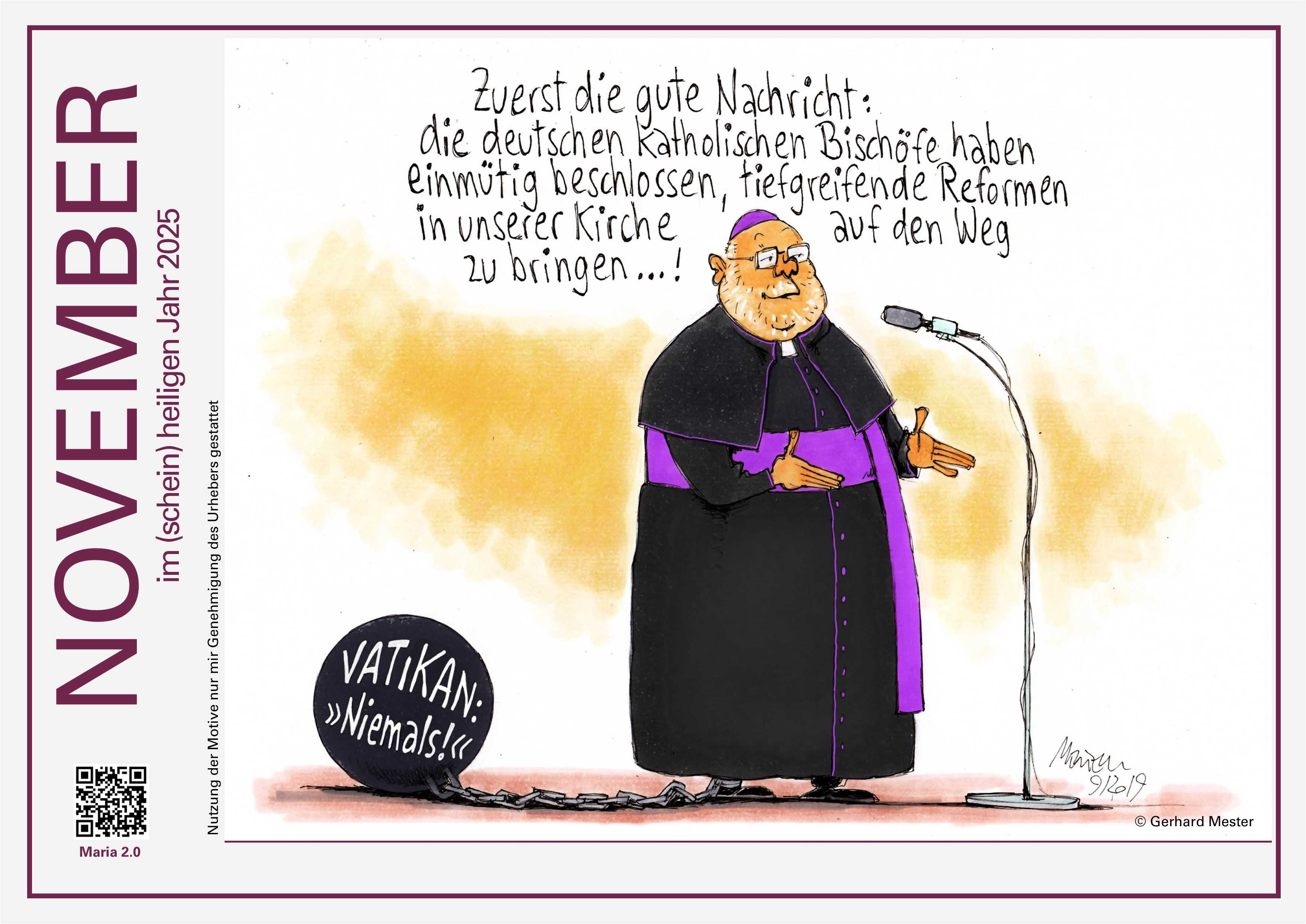
- Details
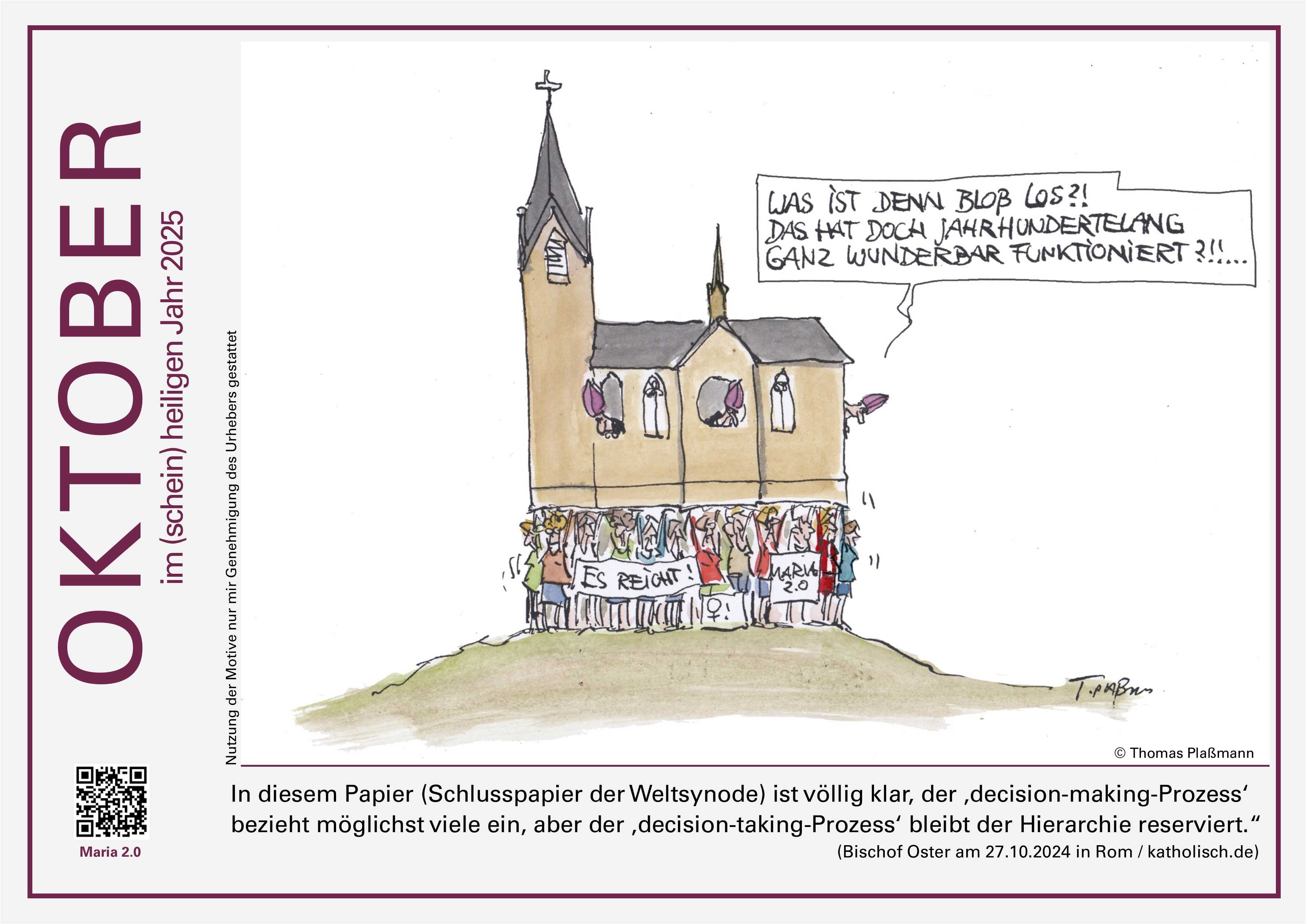
- Details
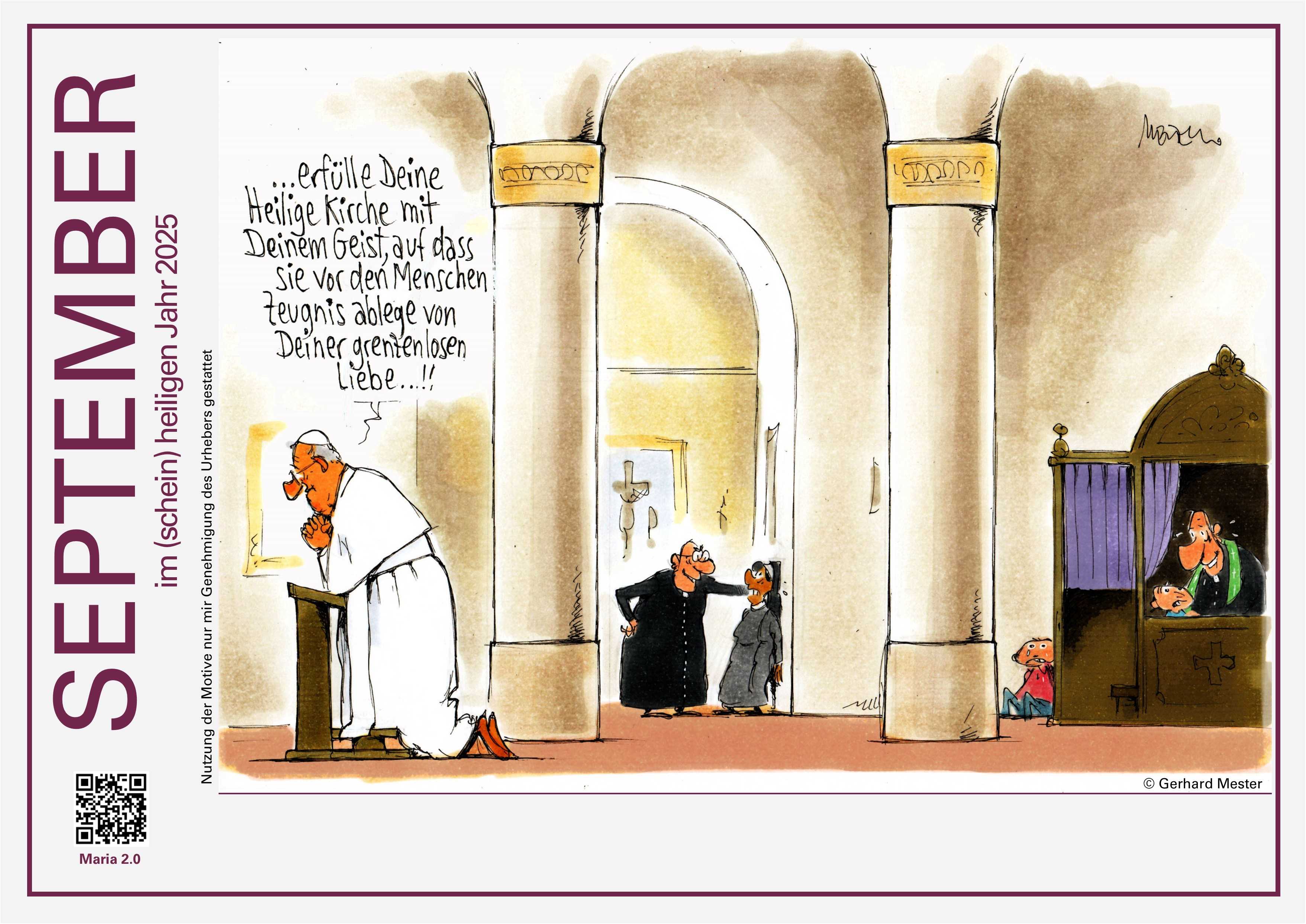
- Details
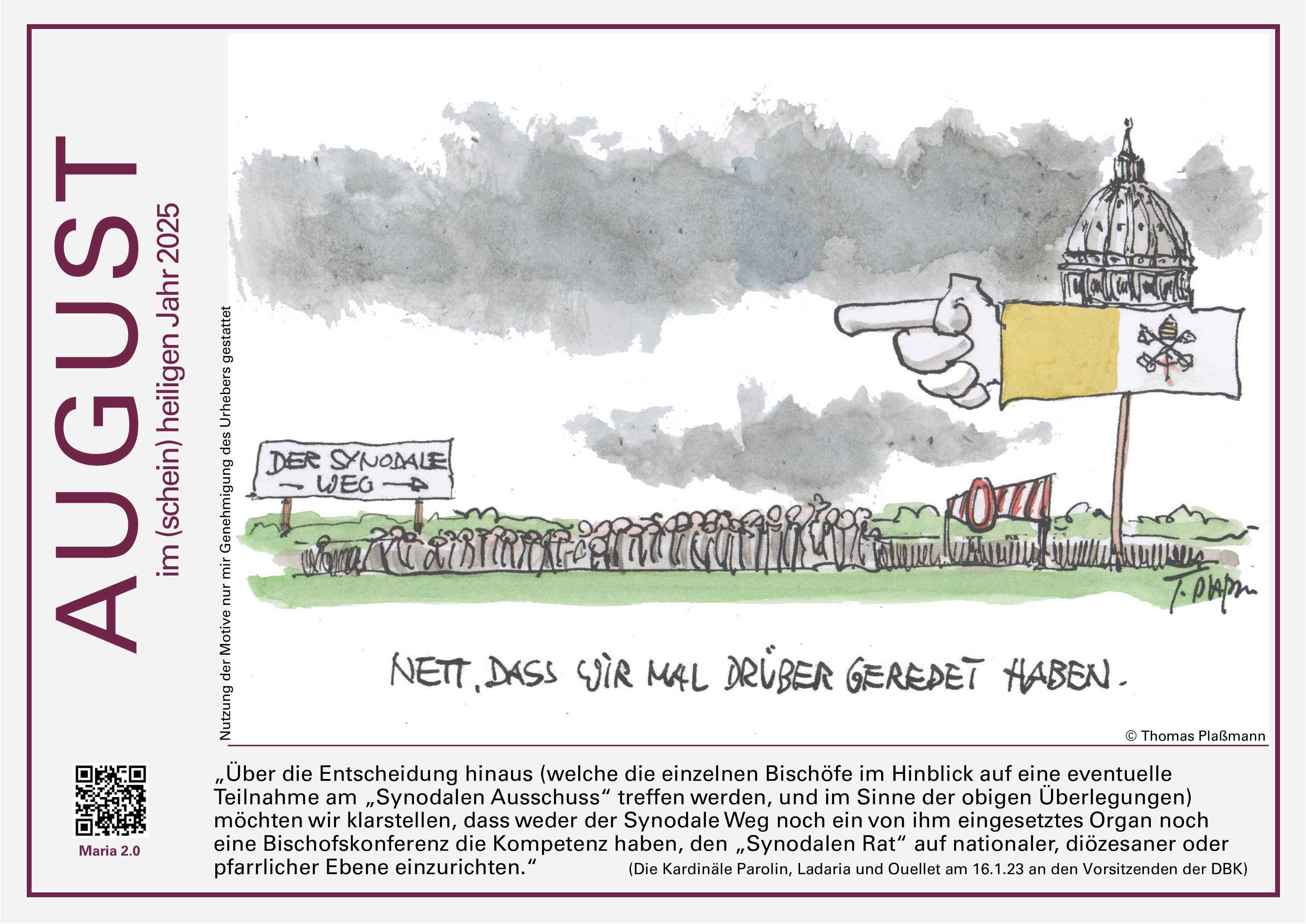
- Details
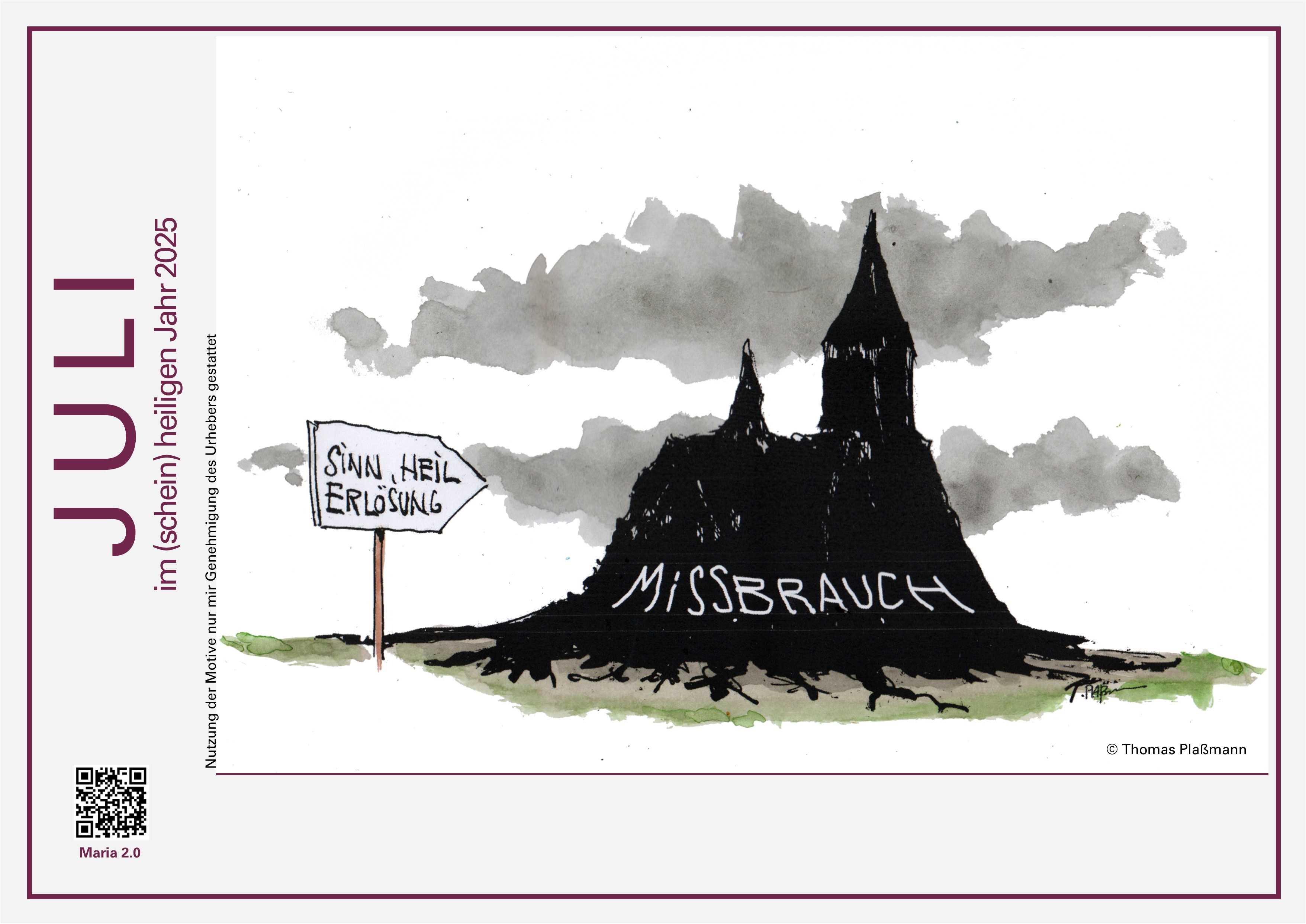
- Details
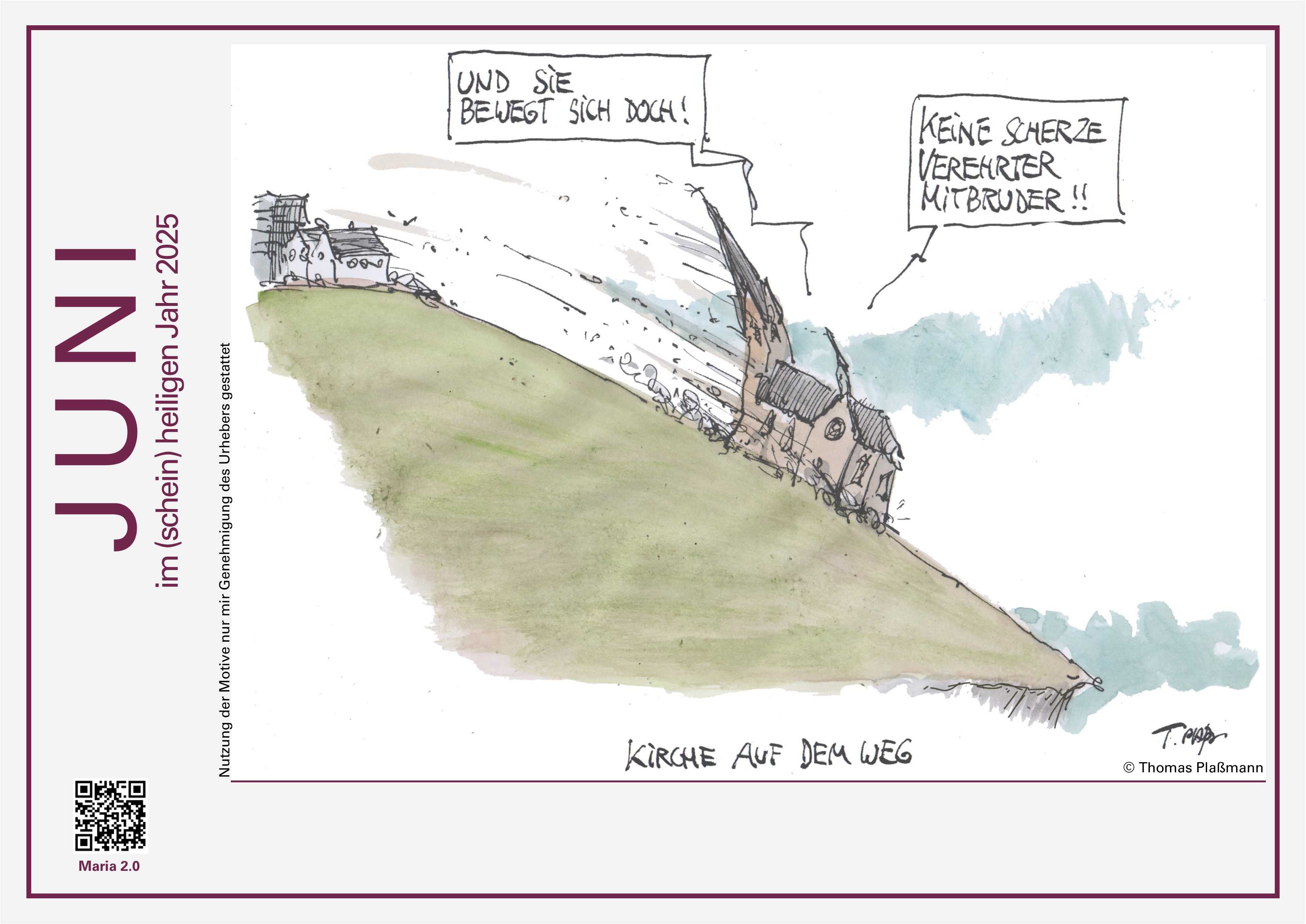
- Details
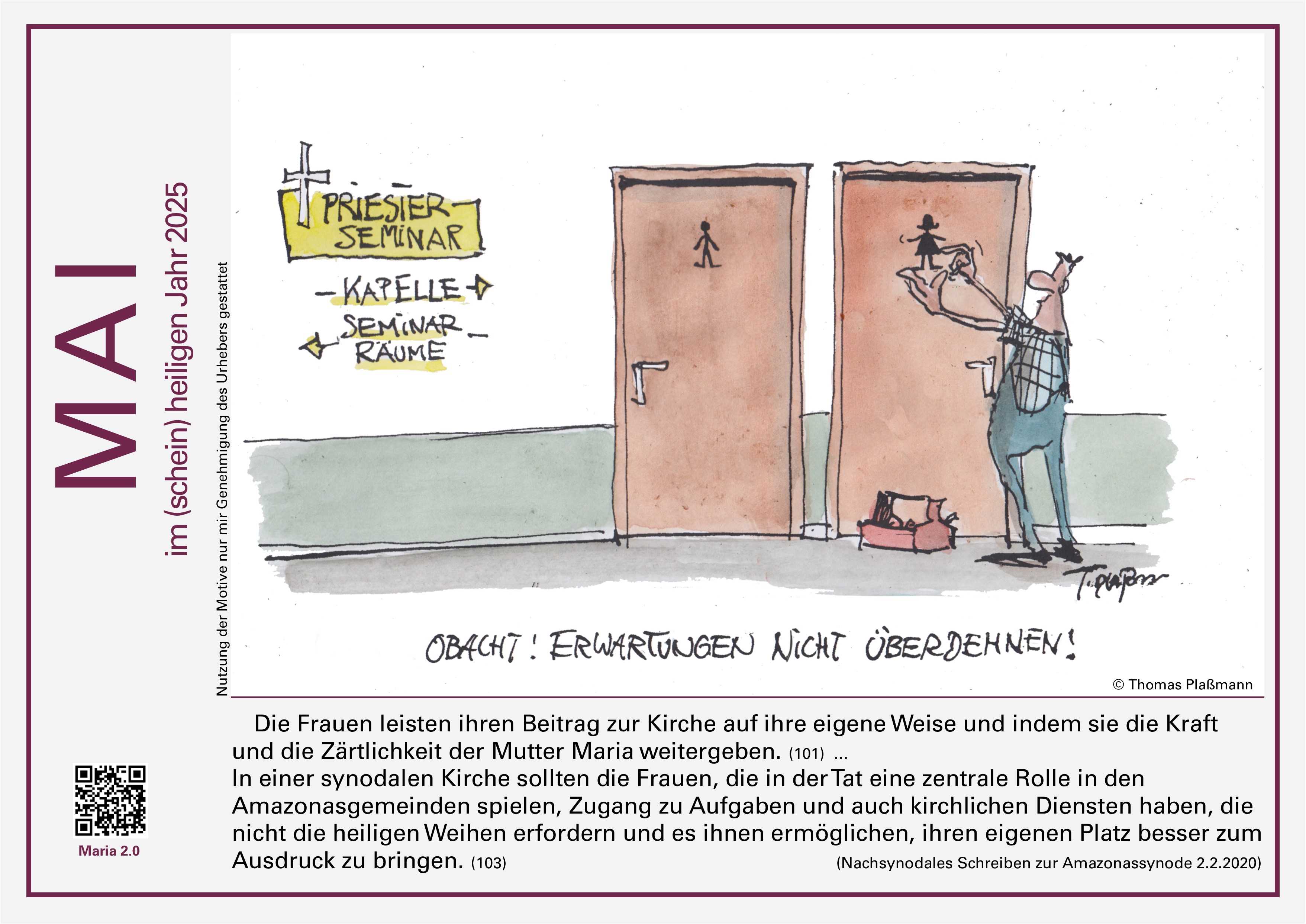
- Details
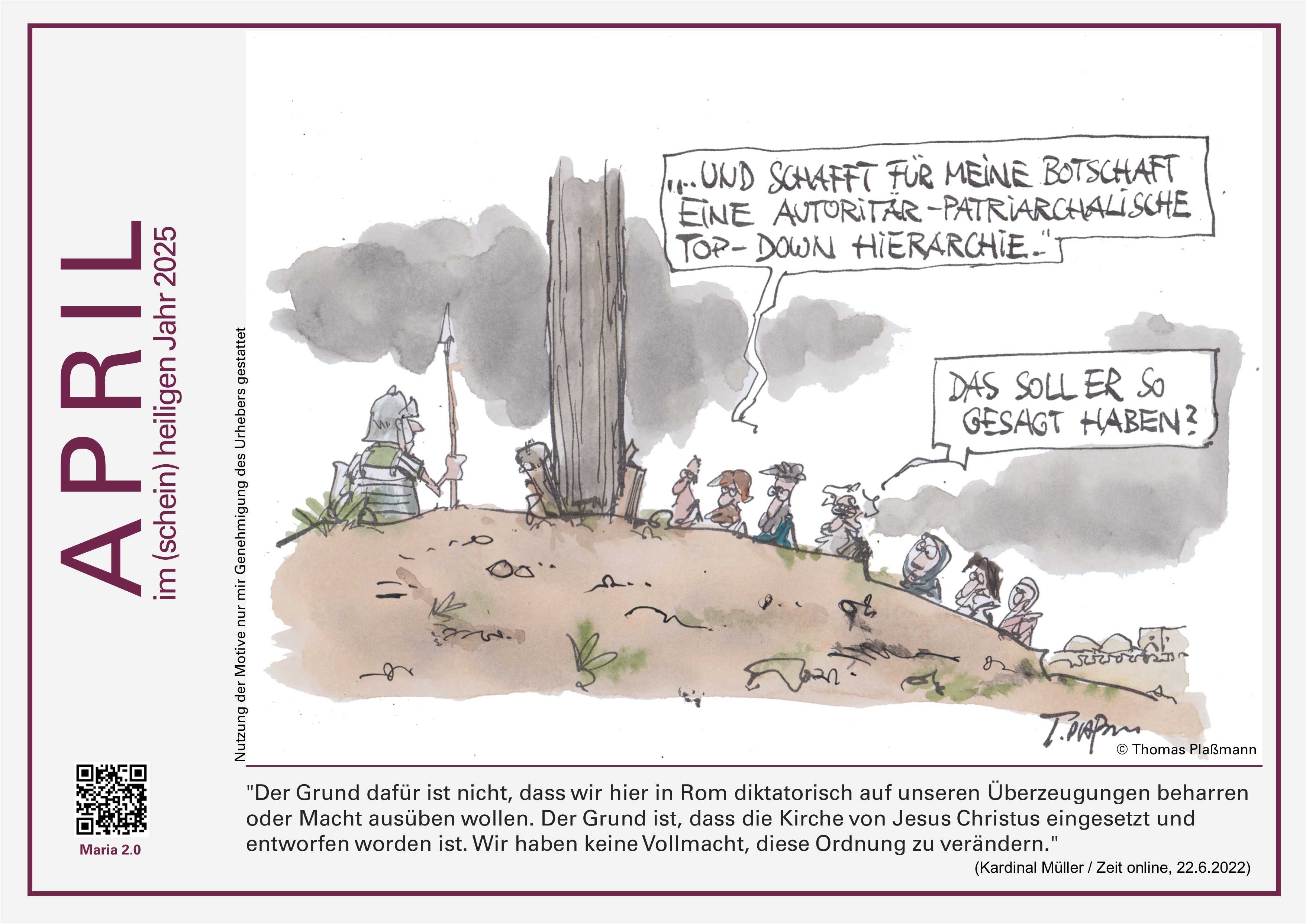
- Details
(klick aufs Bild vergrößert)
Lesung und Gespräch mit Marco Politi zu seinem neuen Buch „Der Unvollendete - Franziskus' Erbe und der Kampf um seine Nachfolge“
27. März 2025 (Do) 19 bis 21 Uhr
Veranstalter: KirchenVolksBewegung Wir sind Kirche in Kooperation mit Pfarrei Heilige Edith Stein, Domberg-Akademie, Dombuchhandlung, Jesuitenkirche St. Michael, Gemeindeinitiative.org, Katholikenrat München, kfd München, Maria 2.0 München, Münchner Bildungswerk e.V., Münchner Kreis, OrdensFrauen für MenschenWürde, Priester im Dialog, Synodal in Augsburg, Zentrum für Ökumenische Forschung (ZÖF) der LMU
Ort: Pfarrsaal von St. Paul, St. Pauls-Platz 8, U-Bahnhof „Theresienwiese“ (U4 + U5)
> Plakat
>Handzettel zum Ausdrucken
- Details
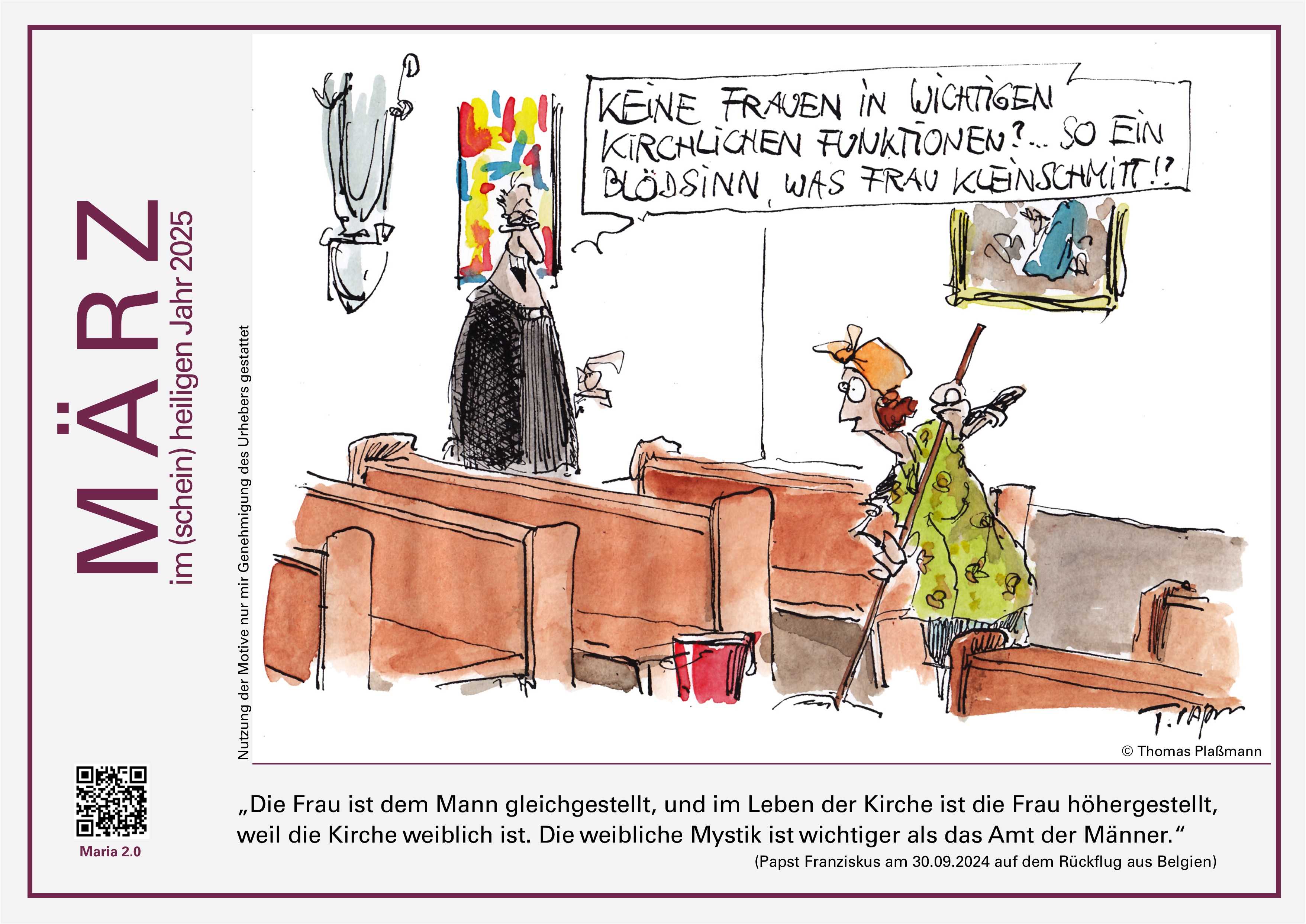
- Details

- Details
Wenn ihr Demokratie leben und gestalten wollt: Kommt nach Hannover!
Kirchentag stellt Programm für Hannover 2025 vor und ruft auf, ein Zeichen zu setzen
Hannover, 28. Januar 2025. 1.500 Veranstaltungen an über 60 Orten in Hannover. Über 3.000 Bläserinnen und Bläser, 1.200 Sängerinnen und Sänger, über 500 Initiativen im Markt der Möglichkeiten auf der Messe und 650 Gesprächsgäste aus dem In- und Ausland. Der Deutsche Evangelische Kirchentag hat sein Programm für das Event vom 30.April bis 4. Mai 2025 in Hannover heute in einer Pressekonferenz im dortigen Haus der Religionen vorgestellt. Bis zu 100.000 Menschen sollen für den Kirchentag begeistert werden. In der gastgebenden niedersächsischen Landeshauptstadt wird fünf Tage lang der einzigartige Schmelztiegel aus gesellschaftlichem Dialog, Glaubensfragen und Kulturhighlights zu erleben sein, der Kirchentage ausmacht.
Ein Schwerpunkt wird, angesichts des Veranstaltungsdatums rund um die zu erwartende Bildung einer neuen Bundesregierung, der gemeinsamen Suche nach einer stabilen demokratischen Basis gewidmet.
Kirchentagspräsidentin Anja Siegesmund lädt explizit zur aktiven Verteidigung unserer Demokratie ein: „Die letzten Monate und Wochen haben uns sehr deutlich gezeigt: Demokratie, Menschenwürde, Rechtsstaatlichkeit, soziale Teilhabe sind nicht gottgegeben. Sie müssen geachtet, verteidigt und erkämpft werden. Und sie müssen gelebt werden. Von uns. Von jedem Einzelnen. Und genau das, wollen wir beim Kirchentag tun. Dazu brauchen wir die Menschen mit ihren Fragen und Sorgen genauso wie mit ihren ganz unterschiedlichen Hoffnungen und Visionen. Wir rufen auf, wenn ihr Demokratie leben und gestalten wollt: Kommt mit uns nach Hannover! Wir können zeigen, dass wir mehr gemeinsam haben, als uns trennt.“
Beteiligt sein werden neben tausenden gesellschaftlich Engagierten auch Bundesministerinnen und -minister, Spitzen von Wirtschaftsverbänden und Unternehmen, Aktivistinnen, Kirchenleitende, Vertreterinnen der Sozialverbände sowie bekannte Namen aus Wissenschaft, Kultur und Internet.
Das geistlich-liturgische Programm des Kirchentages ist in diesem Jahr mit dem gesellschaftspolitischen Programm stärker verschränkt. Generalsekretärin Kristin Jahn: „Glaube findet nicht im privaten Kämmerlein statt. Er wirkt sich aus. In Zeiten, in denen sich Politiker wie Donald Trump als Erlöser bezeichnen, weichen wir einem Thema nicht aus: dem Missbrauch der Religion. Was, wenn Religion benutzt wird, um die Demokratie auszuschalten? Demokratie trägt wie das Evangelium die Verheißung mit sich, ohne Feindbild auszukommen und erkennt an, dass gemeinsames Leben immer ein komplizierter Aushandlungsprozess ist. Schnelle Lösungen sind oft verführerisch einfach, führen aber auch oft zu einem bösen Ende, wie die Geschichte dieses Landes zeigt.“
Verantwortung für Versagen in Kirchen und auch beim Kirchentag selbst soll übernommen werden, indem Betroffenen sexualisierter Gewalt in mehreren Formaten die Möglichkeit gegeben wird, ihre Geschichten, ihr Leid und ihre Forderungen öffentlich zu machen und ins Gespräch zu bringen. Die Podien, Workshops, Gottesdienste und Kulturbeiträge wurden von und mit Betroffenenvertretungen vorbereitet, welche sich auch vor Ort aktiv einbringen werden.
Begegnung und gegenseitiger Austausch auf Augenhöhe – auch insgesamt werden die Teilnehmenden mehr Gelegenheit bekommen, sich selbst am Programm zu beteiligen. Programmleiterin Stefanie Rentsch: „Wir freuen uns, dass wir diesmal ein besonderes Gewicht auf partizipative Veranstaltungsformate legen können. Nicht nur zuhören, sondern aktiv werden, heißt es. In den Räumen der Volkshochschule in Hannover entsteht dazu ein ganzes Workshophaus mit einer ungeheuren Bandbreite von interaktiven Diskussionsformaten.“
Laut und lebendig wird es abends auf den Open-Air Bühnen auf dem Platz der Menschenrechte und dem Opernplatz sowie in einigen Messehallen wenn Stars und Nachwuchshoffnungen eine einzigartige Atmosphäre schaffen werden. Hannover freut sich auf Max Herre und Joy Denalane, die mit dem Konzert „Alles Liebe“ ein Zeichen für ein respektvolles und demokratisches Miteinander setzen wollen. Ebenso erwartet werden u.a. Bodo Wartke, Jupiter Jones, Jamaram & JahcoustiX, der Jazzmusiker Nils Landgren, Ekkart von Hirschhausen, Judy Bailey und der große Altmeister der Klarinette Giora Feidman.
Und auch die gastgebende Ev.-luth. Landeskirche Hannovers bereichert das Programm. Landesbischof Ralf Meister freut sich: „Mit großartiger Musik, mit vielfältigen Räumen zum Austausch und zur Diskussion und mit dem Abend der Begegnung als Highlight gleich zu Beginn wollen wir eine Atmosphäre schaffen, die Menschen aus Niedersachsen, aus ganz Deutschland und aus dem Ausland willkommen heißt.
Wir werden beim Kirchentag über die Chancen und die Herausforderungen von religiöser und kultureller Vielfalt diskutieren. Das ist so wichtig wie selten zuvor. Wir schulden der Welt einen gegenseitig bereichernden Dialog mit Menschen anderer Glaubensrichtungen und auch mit jenen, die ohne Glauben sind.Themen junger Menschen müssen im Zentrum der Diskussion und des Handelns unserer Kirche stehen: Mit dem Format 'Überlebensfragen junger Menschen' mitten im Alltag auf dem Platz der Weltausstellung und im 'Zentrum Junge Menschen' auf dem Messegelände tun wir genau das.“
Das komplette Programm des Kirchentages gibt es auf kirchentag.de/programm und in der neuen App, die zum Download bereitsteht.
Bildmaterial zur Pressekonferenz und vom Kirchentag finden Sie hier.
Hintergrund
Der Deutsche Evangelische Kirchentag wurde 1949 als christliche Laienbewegung gegründet und besteht bis heute als unabhängiger Verein fort. Alle zwei Jahre bringt er als Dialog- und Kulturevent viele tausend Menschen in einer anderen deutschen Großstadt zusammen. Der nächste Kirchentag findet vom 30. April bis 4. Mai 2025 in Hannover statt. Er steht unter der Losung "mutig - stark – beherzt" (1 Kor 16,13-14). Weitere Informationen finden Sie unter kirchentag.de.
- Details

6. Januar 2025/ Kalender zum (schein-)Heiligen Jahr
Das Jahr 2025 ist in der römisch-katholischen Kirche etwas Besonderes: alle 25 Jahre wird ein Heiliges Jahr ausgerufen und 2025 ist es wieder soweit: Seit Weihnachten 2024 gibt es bis zum 6. Januar 2026 die Möglichkeit unter dem Motto „Pilger der Hoffnung“ daran teilzunehmen.
Dieses Motto aufgreifend bringt die deutschlandweite Reformbewegung von Maria 2.0 wiederholt die Hoffnung zum Ausdruck auf eine neue, bessere und jesuanische Kirche, in der alle Menschen gleichberechtigt sind.
Dazu begleitet eine satirische Aktion das Heilige Jahr - inklusive sprechendem Wortspiel: Für 2025 hat die Gruppe einen digitalen Kalender zusammengestellt – 2025 als (schein)heiliges Jahr.
Vieles in der römisch-katholischen Kirche ist nach wie vor reformbedürftig, findet Maria 2.0. Mit Hilfe von 12 Karikaturen soll für jeden Monat eine Schräglage der Kirche überspitzt dargestellt werden. In Zusammenarbeit mit verschiedenen Künstlern* entstand so ein bunter Strauß an witzigen Karikaturen. „Wie so oft bleibt einem aber beim Nachdenken über die Darstellung das Lachen im Halse stecken“, so die Mitglieder der Reformgruppe. „Wir wollen aufzeigen, dass Verantwortliche der Kirche oft Aussagen tätigen, die total schräg sind. Zudem werden Forderungen an Außenstehende formuliert, die im eigenen System selbst nicht umgesetzt werden.“ „Bestes Beispiel“, so eine Mit-Aktivistin, „sind die Aufforderungen des Papstes an politisch Verantwortliche, die Menschenrechte zu achten. Dabei gelten die im eigenen Laden auch nicht!“ Auf diese Doppelmoral will die Aktion zum (schein)heiligen Jahr der Reforminitiative aufmerksam machen – und das einmal nicht mit Streik und Protest, sondern mit unterhaltsamen Karikaturen.
* beteiligte Karikaturisten: Gerhard Mester, Thomas Plaßmann, Klaus Stuttmann
Maria 2.0 – Arbeitsgruppe Kalender zum (schein)heiligen Jahr: Andrea Büttner, Claudia Spieler, Margit Wehner, Silke Weihing, Altfrid Norpoth

- Details
Frauen-Gestalten - Abendmessen mit Frauenpredigten
Monatlich wird durch die Predigt einer Frau eine "Frauen-Gestalt" vorgestellt: Biblische Frauen, selig-oder heiliggesprochene Frauen oder Frauen, die aus einer christlichen Motivation Kirche und Gesellschaft zum Besseren verändert haben, sollen gewürdigt werden. Der Fokus der Predigt liegt darauf, die inspirierende Wirkung der "Frauen-Gestalten" für die Menschen/Frauen heute sichtbar zu machen. Gestaltet und verantwortet wird diese Jahresreihe von der Vereinigung der geistlichen Schwestern in München.
Termine 2025 - hier herunterladen

